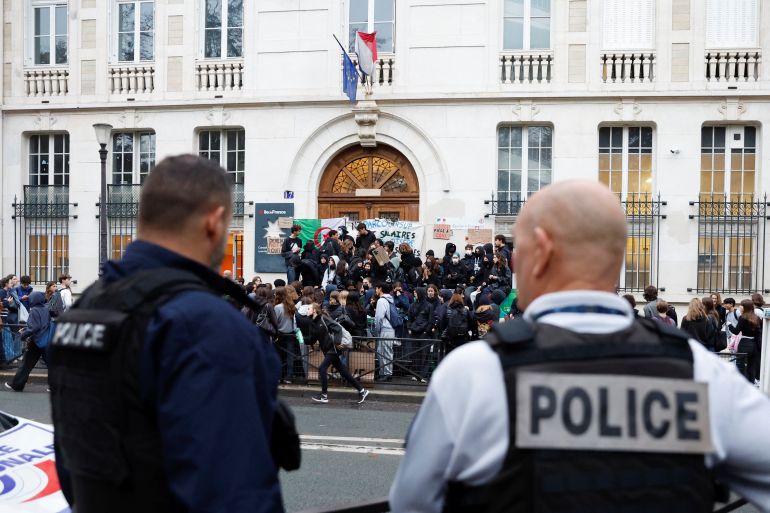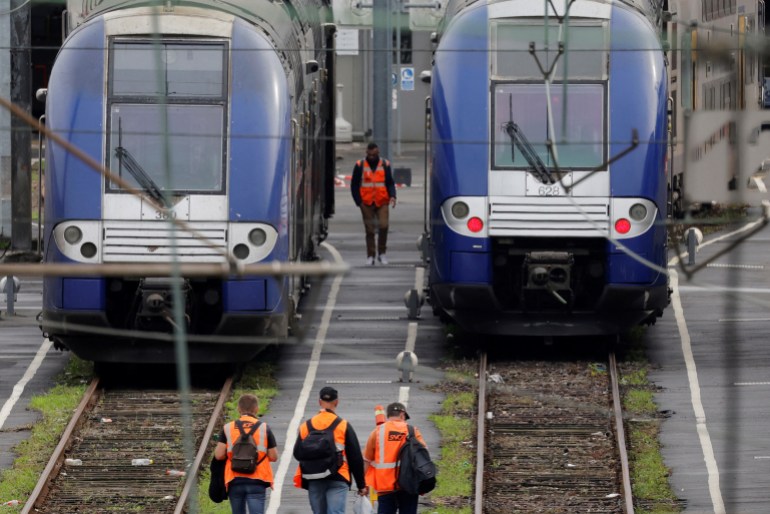Scuffles break out as France begins nationwide strikes for wages
Trade unions begin multi-sector industrial action over salaries amid high inflation, adding to the weeks-long strike in oil refineries.

Protesters have clashed with police and broke shop windows as French trade unions began a nationwide strike to demand higher salaries amid the highest inflation in decades, one of the biggest challenges to President Emmanuel Macron since his reelection in May.
Eleven people were arrested in Paris, the interior ministry said in the early evening on Tuesday, adding that 107,000 people nationwide followed the protest call from left-wing parties and some unions, including 13,000 in the capital. The CGT trade union said 70,000 people took part in the march in Paris.
Keep reading
list of 2 itemsParis petrol stations run dry amid TotalEnergies refinery strikes
Tuesday’s strike, which primarily affects public sectors such as schools and transportation, is an extension of the weeks-long industrial action that has disrupted France’s major refineries and put petrol stations’ supply in disarray.
Regional train traffic was cut by about half, seeking to capitalise on anger at decades-high inflation to expand weeks of industrial action at oil refineries to other economic sectors.
Suburban services in the Paris region and bus services are also affected, operator RATP said, but the inner-Paris metro system should be mostly unaffected.
The effects were visible at Paris hub Gare de Lyon on Tuesday morning, with packed suburban trains disgorging floods of passengers onto the platforms every 15 or even 20 minutes.
“I’ve got a two- or three-hour trip today, rather than an hour and a half normally,” said commuter Yera Diallo.

Beyond transport workers, unions hope to bring out staff in sectors such as the food industry and healthcare.
Trade union leaders are hoping workers will be energised by the government’s decision to force some of them to go back to work at petrol depots to try and get the fuel flowing again, a move some have said may jeopardise the right to strike.
The CGT union notably has called for continued walkouts into a fourth week at TotalEnergies, despite the oil company reaching a deal including a 7 percent increase and a bonus on Friday with other unions. The CGT is demanding a 10 percent pay rise, citing inflation and the firm’s huge profits.
France’s national grid operator RTE warned on Tuesday that prolonged strikes delaying the restart of some reactors at nuclear power group EDF could have “heavy consequences” for the country’s electricity supplies over the coming winter.
Eurostar cancellations
Eurostar said it was cancelling some trains between London and Paris because of the strike.
French public railway operator SNCF said that traffic on regional connections was down 50 percent, but national lines had no disruptions.
As tensions rise in the euro zone’s second-biggest economy, strikes have already spilled over into other parts of the energy sector, including nuclear giant EDF, where maintenance work crucial for Europe’s power supply will be delayed.
A representative of the FNME-CGT union on Monday said strikes were affecting work at 10 French nuclear power plants, with further maintenance delays at 13 reactors and French power production reduced by a total of 2.2 gigawatts.
The strikes are happening in a tense political climate as the government is set to pass the 2023 budget using special constitutional powers that would allow it to bypass a vote in parliament, Prime Minister Elisabeth Borne said on Sunday.
Thousands of people took to the streets of Paris on Sunday to protest against soaring prices.
The leader of the hard-left party La France Insoumise (France Unbowed), Jean-Luc Melenchon, marched alongside this year’s Nobel Prize for literature winner, Annie Ernaux.
Melenchon called a general strike for Tuesday.